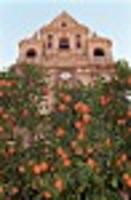

You may have noticed that Spanish restaurants seem awfully quiet… …when you go in. This is probably because you haven’t worked out how to eat like a Spaniard yet.
Read on to find out how to go native and eat like a Spaniard and understand how military-precision timing can be all-important (doesn’t sound like Spain, does it?)
First Breakfast in Spain, most people actually have two breakfasts. The first breakfast is to get yourself started. Since most Spaniards start the day early, the constitution is only ready to receive something light at this stage – around 7:30. So first breakfast usually comprises any of the following:
Second Breakfast is akin to elevenses and is usually around 10-10:30. These are typically very social affairs and rather more substantial than the

first breakfast. If you go into a bar at this time in the morning you may find it difficult to hear yourself think. Second breakfast will comprise any of the following:
Lunch is eaten late. If you turn up at a restaurant and ask to eat at 12:30, you can expect slow service and a limited menu that may comprise left-over tapas from second breakfast. The majority of Spaniards start lunch at 2-2:30 (possibly an hour later at weekends). In fact, if you want to eat at some of the most popular restaurants, you’d be advised to turn up at about 1:45 unless you have reserved a table in advance – at 2:30 the place will be heaving. Like second breakfast, lunch is often eaten out at a restaurant with work colleagues during the week. At weekends, lunch is an opportunity to catch up with extended family – you’ll usually see three generations (or more!) at the table.

During the week (and at other times in holiday areas), you will be able to get a menú del día – a set menu at a very reasonable price that includes a drink, salad, three courses and a coffee. Be aware of the word menú here – this is a ‘false friend’ – when you ask for the ‘ menu por favor’, expecting to get the list of things to eat, the waiter will probably say ‘¡si!’ and walk off, and start bringing you food that you didn’t order. The thing is, you did just order – you ordered the fixed-price set menu (menú del día). You wanted the carta.
Spaniards typically don’t have tapas at lunchtime. Lunchtime is the main meal of the day, to fill up and take your time (in order to help you feel sleepy enough for a few minutes’ siesta afterwards).
At weekends the same establishment that served you a good-value, inexpensive menú del díá during the week will pull out all the stops and serve you an a la carta meal that will cost you twice as much for the “same thing”. The difference is that the cut of meat will be better quality and twice the size, the wine will be better and the desserts more varied.
A typical lunchtime meal has the following:
Supper during the week is usually eaten at home with the family, at any time between 8 and 10. At weekends (starting Friday), suppertime is tapas time. This evening meal is (yet another) time to socialise, chat, flirt and speak very loudly.

Eating tapas (they even have a verb for it – tapear) requires you to do a bar crawl. Although lots of alcohol will be consumed over the course of the evening, it will always be accompanied with some food. This is why it is very unusual to see Spanish people drunk – in fact appearing drunk is very ‘bad form’ in Spain. The only exception to this rule might be at fiestas – then the booze flows freely! Eating and drinking and drinking and eating – these activities are inseparable in Spain.
The Spanish might not take timing seriously for anything else, but for food and drink, timing is important. If you don’t want to stick out like a sore thumb, get there at the right time and eat and drink the right things. Soon enough you’ll know all the waiters and bar staff by their first names and they’ll have ‘your usual’ ready before you even get to the bar. ¡Te aproveche!
By Marcus & Debbie Jenkins
Taken From “A Brit's Scrapbook: Going Native In Murcia”, buy online at www.lamurta.com or contact the authors at